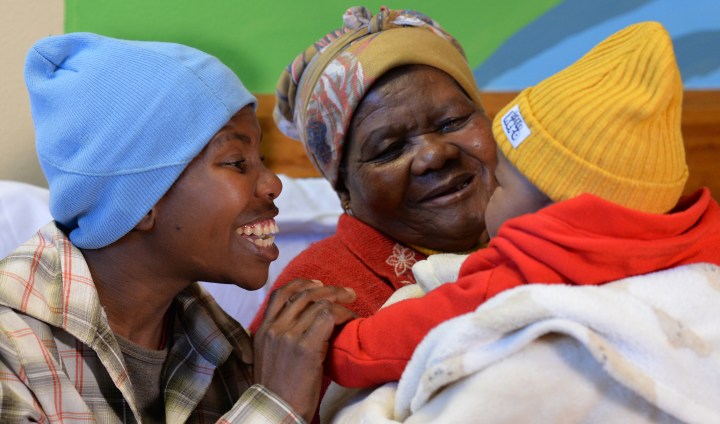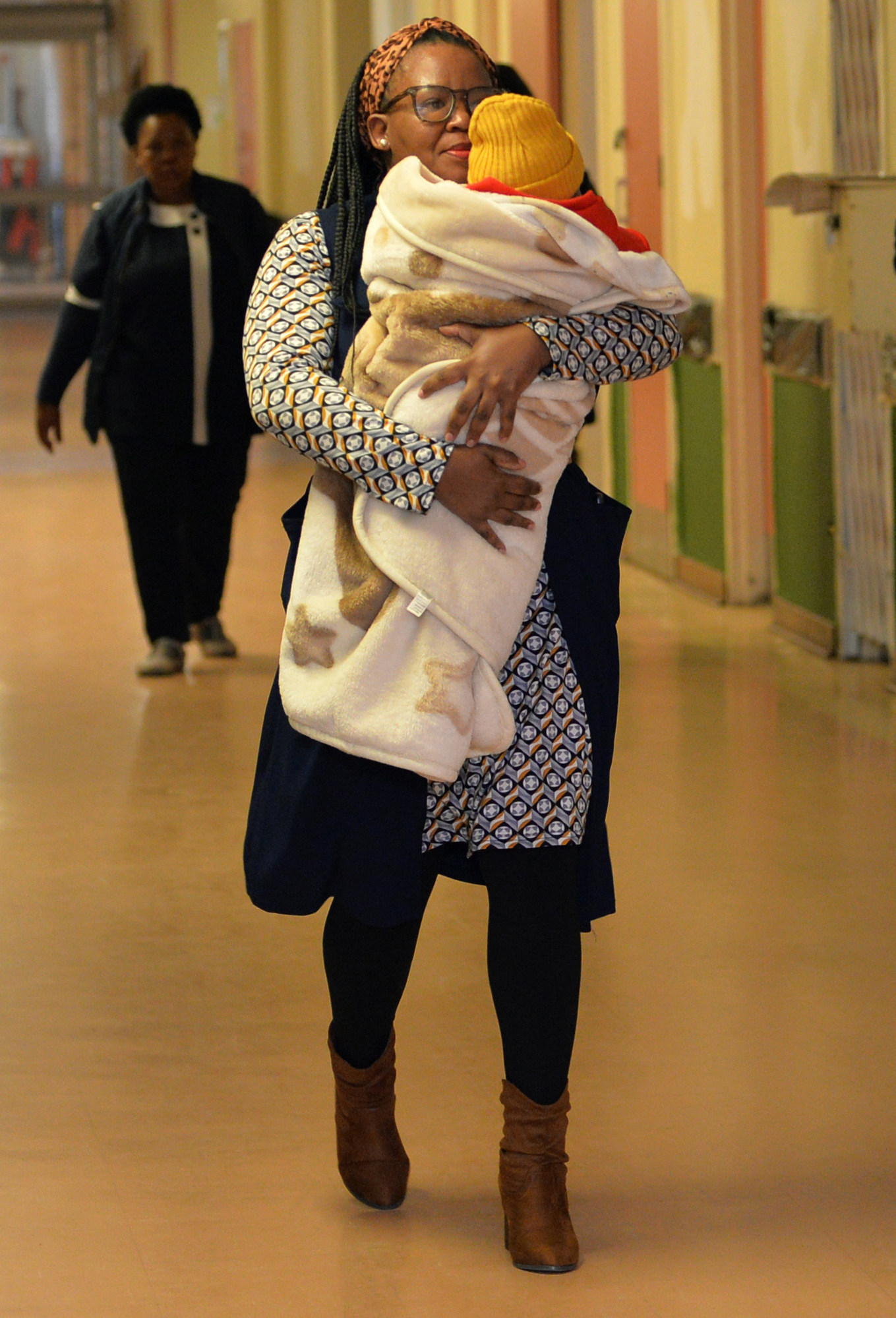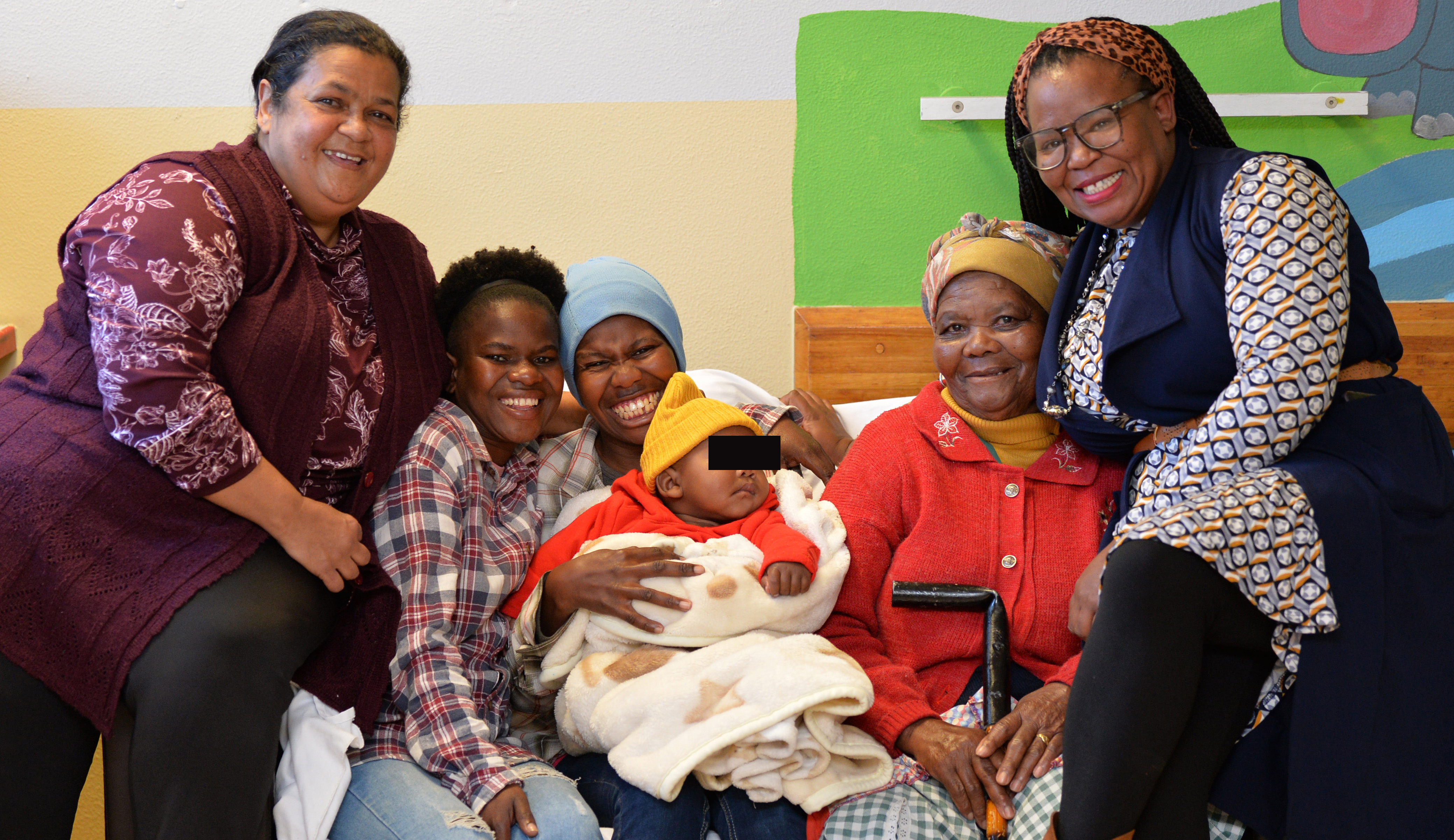HAPPY ENDING
Tears, prayers and celebration as long lost baby is reunited with his family

A baby who went missing from Kenako Mall in Nelson Mandela Bay in November last year has been found, thanks to two employees at Dora Nginza Hospital.
A baby boy, who went missing in November 2022, was reunited with his family in an emotional meeting last weekend, thanks to the efforts of two hospital employees who tracked down his biological mother. He is doing well with his family.
Lettie Mavikela (85) had been praying for the safe return of her great-grandson for seven months. She never left her house, not even to go to church. She knew there would be news of his return and she didn’t want to miss it.
Last weekend social workers reunited the baby boy with his family and Mavikela got the first turn to hold him.

Social worker Portia Marinana carries baby Olothando to be reunited with his family. (Photo: Deon Ferreira)
She repeated his given name, Olothando, over and over. “His name means I love you,” she said.
And then she held him tight and thanked the Lord for his return.
“His name means I love you. Love brought him home,” she said.
Kidnap accused in court
In November last year, the baby was allegedly kidnapped from Kenako Mall, which is close to Dora Nginza Hospital in Nelson Mandela Bay. He was four days old. The woman accused of kidnapping him, Amahle Sigam, who was 19 years old at the time, has been arrested and appeared in court on 30 June and 6 July. She will apply for bail on 13 July.
The baby’s mother, Noncedo Jali, said Sigam had befriended her and her sister, Nomathamsanqa Jali, while Noncedo was in hospital after giving birth. Sigam arrived back at the hospital when Noncedo was discharged with Olothando, allegedly to return the R20 taxi fare that she had borrowed from Mavikela.
Noncedo said Sigam went with her to Kenako Mall, about 1.2km away from the hospital. When she had to rest she gave the baby to Sigam for a second just so she could sit down.
But then Sigam, the baby and a bag containing all his official documents disappeared, she said.
The breakthrough in the case was made by Portia Marinana, a social worker in Dora Nginza Hospital’s paediatric department.
Detective work
An elderly couple approached her to register their grandchild. They told her the mother of the child did not want to be involved. However, Marinana became suspicious when she saw that the name of the child and the mother had been Tipp-Exed out on the baby’s Road to Health card and the hospital’s discharge summary. Through careful detective work she and a senior admin clerk at the hospital, Kaahmila Eagles, managed to track down the mother’s original patient folder.

Baby Olothando with his family and hospital workers Kaahmila Eagles and Portia Marinana, who tracked his family down using hospital records. Olothando’s mother gave her permission for the baby and his family to be identified and photographed. (Photo: Deon Ferreira)
“I slept well last night,” Noncedo said. “My heart is full of joy.”
Nomathamsanqa added: “We are grateful to the Lord for protecting him and keeping him.”
Baby Olothando received his new documentation on 3 July.
Later, Marinana found out that the suspect, Sigam, had pretended to be pregnant.
“We think she got away with it because she was a little bit chubby,” Marinana said. Her boyfriend’s parents were convinced that she had been pregnant.
Baby Olothando is one of only a few kidnapping victims to be found and reunited with his family.
On 4 May 1994, baby Micaela Hunter was kidnapped from Marymount Maternity Home in Joburg when she was less than a day old. She was reunited with her family two years later when the boyfriend of the woman who had kidnapped her surrendered her to the police and said he feared that the child had been kidnapped.
Zephany Nurse was abducted from Groote Schuur Hospital in Cape Town in 1997. She was found 17 years later. Her kidnapper, Lavona Solomon, was sentenced to 10 years in prison for kidnapping Nurse as a baby and renaming her Miché.
Human trafficking risk
Human trafficking expert Chantal Coetzee, who runs the NGO Shattering Shackles, explains that children, and especially those who live in disadvantaged communities, are at high risk.
The NGO provides support to human trafficking investigations.
“We just had a case where a mom wanted to send her son to a ‘wealthy uncle’ in KwaZulu-Natal. Red flags went up everywhere for me. He never showed interest in her other children. He refused to give his address. This mother did not know where he stayed. She just believed his promises.
“People don’t realise the extent of it. Babies do get sold or put up for illegal adoption as well.”
Coetzee says it is vital to register children and get official documentation. It is also vital that parents know they can immediately report a child missing and do not have to wait for 48 hours.
In an unrelated case, a farmer from Aberdeen in the Karoo appeared in court this week after he was arrested on five charges of human trafficking, rape, assault, intimidation and child labour. .
Although the case of baby Jali was probably an isolated one and not related to trafficking, thousands of other young and vulnerable children are at increased risk of human trafficking in South Africa.
In the past year, the Directorate for Priority Crime Investigation (the Hawks), a division of SAPS, began 29 investigations into trafficking – 19 for sex trafficking, eight for labour trafficking, and two for unspecified forms of trafficking – and continued 35 investigations from previous reporting periods.
This is almost double the number from the previous year.
Prosecutions were initiated against 30 suspects in 15 cases. Another 28 cases involving 74 suspects are continuing from last year.
Convictions have been obtained in 14 cases and sentences have ranged from 15 years to life imprisonment.
A recent report on human trafficking in South Africa by the US State Department points out that there is still no integrated data collection system that can help to fight human trafficking.
It says high death rates from Covid-19 resulted in more orphans, and more children vulnerable to exploitation. There have been reports of boys being lured out of the country on fake sports scholarships and then forced into exploitation. DM



















Comments - Please login in order to comment.